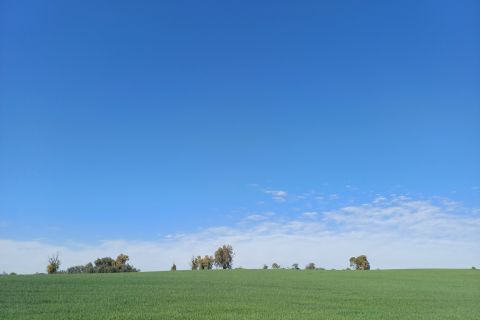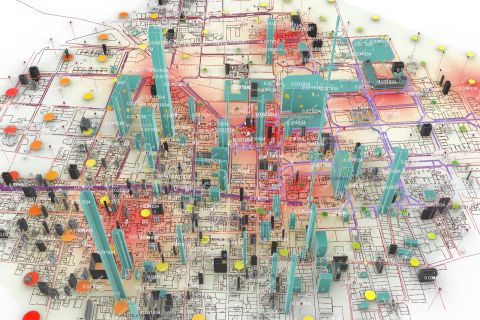Master's Program in Fine Arts (M.F.A.)
התכנית לתואר שני באמנויות
برنامج اللقب الثاني في الفنون
Each one of the program's participants is perceived as a unique axis around which all of the program's major principles revolve: independent studio work, personal instruction, group studio critique, exhibits, theoretical studies, meetings with artists and guest lecturers, final exhibits and a written assignment. The program is structured around a basic academic framework and a permanent teaching team, but it strives towards maximum flexibility in order to accommodate itself to the dynamics of the group and the personal needs of each participant.
The duration of the study program is two academic years.
The studio work is the program's basic frame of reference, the central axis of the degree's assignments and an integral part of these. The MFA students are perceived as highly motivated individuals capable of developing an independent, creative course and an individual process of research in the studio, while artistic creativity remains the center of the critical discussion of the program's activity and the student's dialogue with his/ her colleagues and the program's staff.
Bezalel Academy provides each student with a studio; the independent activity in the studio is integrated within the entire framework of the program's academic activities and enables the student to form and develop a dialogue, receive feedback and assessment from colleagues, teachers, guest lecturers and invited visitors.
The encounter between the mature and experienced artist and the art student is a historic, pedagogical format in which an artist teaches an artist. Individual instruction facilitates an atmosphere of dialogue between a student and a lecturer, and the opportunity to relate to the works of a single student. This type of encounter plays an important role in the student's process of forming his/ her artistic identity. These meetings will place an emphasis on reinforcing the original components and developing the personal aspects in the student's work; the student's work will be "read" with the purpose of identifying processes and placing it in a broader cultural – social context and allowing the lecturer to provide appropriate instruction and assistance.
Each student is able to choose the lecturers who will personally supervise his/ her work throughout the year. This instruction takes place in the student's studio, while relating to his/ her work and these meetings take place on the basis of a work plan agreed upon by both parties. The pool of lecturers is compiled from the program faculty staff members who are available to the students, with the approval of the teaching committee.
A group seminar framework convenes once a week to discuss the works of participants in the context of the entire group. This is a broad framework whose goal is to develop and vary the ways of relating to works and discussing the personal work processes in the studio. The seminar centers on a current critical discussion of the studio work procedures. In this seminar the student develops skills of fluent articulation and self confidence in the discussion of both his/ her own works and those of other students. A special emphasis is placed on encouraging and observing the personal process and its internal logic in the broader context of the contemporary artistic event. In the course of the seminar there will be meetings with active artists and other figures from the art scene discussing their work and procedures as well as trends in the world of art in both the local and international context. At the end of the first academic year, each student will present a conclusive exhibit of his/ her works and an in-depth discussion will be held in the presence of the program advisors and the other students. In the framework of this workshop, in the second year of study, a discussion will take place whose main goal is the formation of the student's artistic work in preparation for the final exhibition. Each student's work will be discussed extensively at meetings in which the entire group will participate as well as the personal advisors and other teachers. This discussion will be held with an affinity to the broader theoretical contexts of the concepts that the student is working on.
These workshops focus on questions of artistic theoretical and practical relations; on theories of plastic art and the surrounding areas – literature, architecture, cinema, philosophy, economics, sociology, design and contexts of exhibition – with an emphasis on various contexts of the present in relation to these. In the framework of these workshops, there will also be seminars for which guest lecturers will be continuously invited to give a series of lectures.
The theoretical studies are an integral part of the program and these will be held at the Bezalel Campus on Mount Scopus, Jerusalem at the Department of History and Theory.
During the course of study each participant will present his/ her works in various frameworks and hold discussions in which the students work will be evaluated throughout the program.
Gallery
The program has been allocated exhibit spaces in which the program participants will show their works. Some of these exhibitions will be internal and others will be open to the public. Furthermore, exhibitions that are relevant to the subjects discussed in the program will be shown at the initiative of the program.
During the course of the program the students will meet with artists, critics, theoreticians and curators who are active in Israel and abroad. These meetings will expose the students to a wide range of perspectives and languages of dialogue with a close affinity to the operative aspect of the fields of production, exhibition and criticism of today's art. In the framework of these visits there will be seminars, lectures, workshops and visits in the studios. The studio visits enable an encounter and discussion between each and every student and the guests visiting the program, and these constitute as a part of the program's academic process; the visitors program is intended to bring the participants in touch with a broad range of perspectives of artists, critics, theoreticians and curators from Israel and abroad. In addition to the guests that are invited by the program, efforts will be made to respond to the initiatives of the program participants to invite additional guests. The program encourages return visits and forms continuous ties with the staff of lecturers from abroad some of whom come to the program on a regular basis of two – three times a year.



